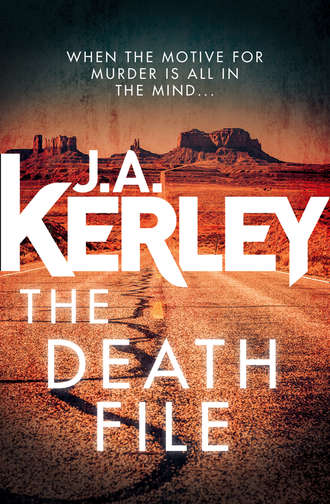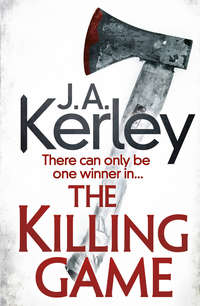
Полная версия
The Death File: A gripping serial killer thriller with a shocking twist
“It’s a mixed neighborhood, Sergeant. Rich, poor, everything in between.”
Castle nodded toward the body. “If that lady lived in Scottsdale she’d be alive right now.”
“You were here first … what was the entry point?”
“No break-in that anyone found yet. A door got left unlocked. People get careless.”
Novarro crossed the room. She’d seen a sign out front advising of a security system, which meant a control panel. Novarro found it in the closet nearest the door. The green power supply light was on.
“Was the system armed when you arrived, Sergeant?”
“Turned off by Sanchez. She has a card key.”
“What else appears missing?”
“There’s an empty space on the vic’s desk where a computer was. Desk drawers open, emptied.”
Novarro pointed across the room. “Yet right there sits a Sony Bravia … what? Fifty-inch flat-screen TV? About a grand, right?”
Castle shrugged. “The perp or perps killed the vic and started bagging up shit, but got spooked by something. A cop siren maybe, heading to some other problem in your, uh …” a hint of grin, “mixed neighborhood.”
“Must have been a real scare, Sergeant Castle,” Novarro said, leaning against the wall and giving Castle an indulgent look. “The doc’s wearing a Movado watch, five-six hundred bills or so. Would have taken two seconds to pop off and pocket.”
Castle jammed his hands into his pant pockets and scanned the ceiling for several seconds. “OK, so fuck my idea. What’s yours, Three-Point?”
The name froze Novarro, but only for a split second. She studied the body on the floor before walking to the sliding glass door and tugging with a gloved finger. “There’s an old Tohono O’odham Indian saying, Merle,” she said. “‘O’nota’y’tanga olemano.’”
Castle rolled his eyes. “Meaning?”
Novarro stared at a black vulture circling against a blue sky. Somehow the bastards always knew.
“I’ll get there when I get there.”
3
The nameplate on my door said, Carson Ryder, Investigative Consultant, Senior Status. The title was an invention of my boss at the Florida Center for Law Enforcement. Being a “consultant” got me out of the stultifying barrage of administrative meetings and other make-work tasks associated with any bureaucracy, even one headed by the bureaucrat-averse Roy McDermott. “Senior status” pretty much allowed me to do whatever I wished, as long as the end result was a better, safer Florida.
On my first day, Roy had said, “I don’t really care what my people do, Carson. All I ask is that it stay within legal bounds and lets me stamp ‘Case Closed’ on a shitload of files.”
So far, I hadn’t let him down.
Outside my twenty-third story window lay the jagged and glittering skyline of Miami, the gemlike turquoise blue of Biscayne Bay in the distance. I was unable to appreciate the beauty, sitting at my desk and filling out reports, grumbling that for all my status bought me, I still had to do paperwork just like a beat cop in Mobile, Alabama, which is how I started.
My phone rang – mobile, not landline – telling me I probably knew the caller, which I did: Vince Delmara, a top homicide detective with the Miami-Dade County PD. We had been friends since my first case for the FCLE, almost three years ago. Vince was old-school, the best aspects at least, believing that experience, hunches, and shoe leather were what solved cases.
And sometimes just plain dumb luck.
“Question, Carson …” Vince said, jumping right in. “You still seeing that shrink in Miami Beach … Dr Angela Bowers?”
I threw my pencil to the desk and leaned back. “What you talking about, Vince?”
“You see a lot of crazy bullshit,” Vince said sotto voce, like sharing a secret. “It’s all right to visit a therapist. Anyway, I ain’t gonna tell no one.”
“Right now, I’m thinking I’m not the one needs a shrink, bud.”
A sigh. “You’re really not seeing a psychologist, are you, Carson?”
“I think I scare them. You got a point here, Vince?”
“I got a problem. You busy, or can you meet up?”
Five minutes later I slipped on a blue linen sport jacket to cover the shoulder rig, dusted eraser rubber from my blue jeans, and headed out, hoping paperwork faeries slipped in to finish my drudgery.
The offices of the Florida Center for Law Enforcement were on floors twenty-two and twenty-three of Miami’s towering downtown Clark Center, the upper location for administrators and top investigators, the lower floor for mid-echelon investigators and support staff. On the way to the elevator I stuck my head into a small office being painted and prepped by a maintenance staffer: dropcloths on half the floor, a ladder, a couple cans of paint.
A painter was crouched in a corner and painting the floor molding.
“The guy who was here …?” I said.
The painter frowned. “He left. Said I was whistling out of tune.”
I continued to a conference room and looked through the glass window to see fellow investigator, Lonnie Canseco, meeting with a pair of forensics accountants from the Tallahassee office. Cold: Not what I was looking for. Onward to a smaller conference room, this one with an FCLE operations manual on the round table, the empty pushed-back chair hung with a purple blazer, size 44 long.
Getting warmer.
I jogged back to the painting-in-progress office, checked for a gray canvas bag beside the desk. Not there, which meant I was warmer still. I took the back staircase to the floor below and pushed through a metal door, entering another door to the rear and smelling sweat and body heat. Angling past a partition I looked across a white-tiled expanse to see the black expanse of Harry Nautilus, pulling on his pants beside a naked white guy.
Hot. I turned to the nude guy, Larry Vincente. “How long was it, Larry?”
Vincente grinned from earlobe to earlobe. “Almost nine.”
I shot a thumbs-up as Vincente shut off the shower nozzle and stepped to a rack to grab a towel. Like most pool investigators Vincente spent about a dozen hours a day working cases and the FCLE’s small gym was a place to grab a quick, stress-reducing workout: a half-dozen strength machines, plus stationary bikes and treadmills. Vincente tried to get in six treadmill miles a day, but today had managed nearly nine – either a slow day or a fast run.
“Let’s boogie, amigo,” I said to Harry, now dressed and cramming sweaty shorts and tee into the gray gym bag. “It’s time to meet Vince Delmara.”
Harry splashed on a palmful of 4711 cologne, light and floral and antithetical to the wet heat of a South Florida summer. “Delmara? The Miami detective who’s afraid of the sun.”
I made a biting gesture. “It’s the vampire in him.”
“Can’t wait.”
Ten minutes later we were racing toward Coral Gables in my moss-green Range Rover Defender. Fully equipped for a safari, it rode hard, ate gas, had a manual transmission prone to sticking, and the AC wasn’t quite up to the Miami heat, but if a case ever took me to the African veldt, I was ready.
“You say this thing belonged to a drug lord?” Harry yelled above the siren as we blew down I-95.
“Confiscated. I found it in the motor pool.”
“When you gonna paint it with a roller?”
Harry was referring to my former ride back in Mobile, a battered pickup I’d repainted gray with ship paint and a roller. He knew because three years ago he was my partner at the Mobile, Alabama, PD; the man who’d convinced me to join the force when I was living on my mother’s slim inheritance and wondering what to do with a psychology degree gained by interviewing every imprisoned maniac in the South.
We’d been the Harry and Carson Show for over a decade and last year a truly odd quirk of Fate had brought us together again, him on a case from Mobile, me on one in Florida. The cases converged and became one. After we’d closed it, Roy offered Harry a position with the FCLE. Harry finished out his time with the Mobile PD and had made the move just two weeks ago.
“I’m keeping the green,” I said. “It’s such a cheerful color.”
Coral Gables is about six miles from downtown and we made the trip in five minutes. We pulled into the palm-canopied drive, seeing two MDPD cruisers plus a command vehicle, and vans from the ME’s office and scene techs.
“Here we go, Cars,” Harry said. “My first Miami crime scene.”
We strung our IDs around our necks and entered the home, a celebration of pastels: yellows, blues, corals; an uplifting color scheme and très Miami. Vince Delmara, whose spirits didn’t appear lifted, was conversing with a scene tech on the corner, the three-inch bill of Vince’s black fedora projecting past his nose, but not by much. Vince wore a cobalt suit and white shirt, his only concession to color a lavender silk tie. Harry and I went over for introductions.
They shook hands as Vince’s major-league beak probed the air around Harry. “Jeee-sus, something smells great.”
“I shaved and showered before we left HQ,” Harry said.
“You set a high bar,” Vince said. “I try to remember to wash my hands after pissing.”
Vince led us into the house, a flurry of activity, scene techs dusting for latents, vacuuming the carpet, studying doors and windows for signs of entry.
“Who’s the vic?” I asked as we followed Vince to the side of the house. A young tech, Darla Brady, followed with a plastic evidence bag in her hand.
“Bowers, Angela. Psychologist. All we know.”
“Cause?” I asked.
“A slashed throat. She bled out in seconds.” He paused. “It looks like a single cut, Carson. Through the carotid and jugular on both sides. No hesitation.”
A tingle of ice ran down my spine. We saw a lot of knife wounds, most ragged horrors that indicated frenzied slashing. This seemed a professional-style hit: the victim held tight while a razor-sharp blade did its ghastly work. No hesitation, no qualms, nothing but a single and probably practiced move.
We entered the room and I saw a woman in her early fifties, her face a rictus of fear, a dark echo of her final moments. A lake of blood pooled beneath her lifeless body. Harry knelt beside the sprawled form.
“Like Vince said, one deep cut from ear to ear.”
“Take a look at her face, Carson,” Vince asked. “Look familiar?”
“Vince, she’s not my shrink. Or anything else.”
“You’re sure you never saw her before?”
“I wish I wasn’t seeing her now.”
“Bring it, Brady,” Vince said, waggling his fingers in the gimme motion. The tech jogged over with the evidence bag and I saw a 5 x 7 index card inside.
“We found this in the vic’s top-right desk drawer,” Vince said. “On top of everything else there. Position tell you anything?”
“She kept the card within reach. Says it’s probably important.”
“Show the card, Brady.”
The tech held it out to me at eye level. Printed on the card in heavy black marker was my name. After it were three question marks. I held it up to Harry.
CARSON RYDER???
“Why am I not surprised?” he said.
We returned to the department to stare at a copy of the card found in Dr Bowers’s desk drawer. I’d tacked it to a bulletin board in a conference room.
“To me,” I said, “a single question mark suggests a question about an unknown, like ‘Who is this guy?’ Multiple question marks seem to suggest a weighing process, like, ‘Is he the one?’ or ‘Should I contact him?’”
Harry pondered the ceiling. “I’d like to hear you try that one on a witness stand, but I like it. Of course, the woman might have simply had a jones for question marks.”
“We’ll find out soon enough, I expect. Vince will put nails in the killer’s coffin. He’s an ace.”
Harry frowned. “You’re not going to take a case that, uh, has your name written all over it?”
“Doesn’t matter what I want,” I sighed. “I’m excluded.”
“Peripheral involvement,” Harry said, seeing the problem: I was a facet of the case.
I nodded. “No way I could be the lead investigator on the Bowers case.”
Harry stood and went to the window, studying the Miami skyline. “OK, say Vince Delmara led the investigation. If you had thoughts on the case, could you present them to Vince?”
I nodded. “It’d be nuts not to be able to drizzle ideas to Vince. I’m simply restricted from any major role.”
“And you want to follow this thing. From up close?”
“A dead woman I never met had my name in her desk. I’d like to know why.”
He turned from the window. “So what happens if I take the Bowers case as lead? My very first FCLE case. You could follow me around like a little doggie and drizzle all over the place.”
I gave it a half-minute of consideration. “That actually makes sense. And doesn’t break a single rule.”
“Maybe not, Carson. But let’s try it anyway.”
4
Detective Tasha Novarro pulled into the lot of a three-story redbrick building in an industrial park where Phoenix abutted Tempe. Emblazoned across the top story was a chrome-bright sign proclaiming DataSĀF. Beside it was an amoeba shape with squiggly lines running horizontally through it, probably representing a cloud. Novarro had combed through Meridien’s financial records, finding receipts from DataSĀF and figured Meridien, like many concerned with security or just fast and easy data storage, sent her files to a data-storage firm.
There was private security in the lobby and Novarro flashed the brass pass. “Where you headed?” the rent-a-cop asked, an older guy in a uniform the color of a toad.
“I thought I was there,” Novarro said. “DataSĀF. That’s how you say it, right?”
“There’s three divisions: MediFile, BusiniFile and JurisFile.”
“The head office.”
The security guy grinned and lowered his voice. “Actually, it’s all DataSĀF upstairs. It started as three divisions but they’re under the same umbrella these days. I think they think it looks impressive.”
Novarro scanned the open atrium, glass everywhere, five-foot-diameter concrete planters holding small trees. At the far end an immense globe made of hundreds of squiggling rays of multicolored glass hung from the ceiling. Novarro recognized the artist’s work – she had seen it at the Desert Botanical Gardens a few years back – and remembered his name as Dale Chihuly. She figured it was an expensive piece of glassware.
“Helluva big building,” she said. “How many people work here?”
“About thirty.”
Novarro raised an eyebrow. “Must have a lot of empty offices.”
The security guy grinned. “What they got are computer servers, three full floors of the things lined up like black refrigerators with blinking lights. They call it the cloud but it’s made out of machines. It’s spooky.”
Novarro thanked the guy, picked up a visitor pass, and walked to the elevator. Phoenix PD had switched its files to the cloud – calling it “offsite storage” in official parlance – a year back. Whenever Novarro wanted a report or information she sat at her computer and bang! there it was. Sure beat riffling through clunky filing cabinets. Good for you, Cloud, she thought, momentarily wondering if it was cumulus or cirrus.
The elevator arrived and Novarro stood in the lobby of DataSĀF; hues of pinks and grays with a receptionist arena at the far end. A young woman with a severe look and hair sat within the granite-topped semicircle holding a clipboard. She wore a phone headset and was feverishly inputting data into a computer. “There’s a sign-in sheet,” the woman said, not looking up.
“I’m the heat,” Novarro said, holding up the badge. “I need to talk to someone about accessing a client account.”
The woman didn’t blink. “Take a seat and I’ll tell someone you’re out here.”
The chairs were designed to afford hipness before comfort and Novarro found sitting in one of the wobbly rail-and-canvas monstrosities was like trying to stand in a hammock. She leaned against the wall and read DataSĀF’s annual report, the only reading material in the room. It seemed DataSĀF was the largest cloud-based business data storage firm in the Southwest. They were growing at an average of 16 percent a year. They stored about a zillion wiga-diga-gigabytes or something like that. Their motto was “Putting Security Above All.”
Novarro fought the yawn and tossed the report back on a low table.
After ten minutes she returned to the receptionist, who seemed to have moved nothing but her fingers during that time.
“Excuse me,” Novarro said. “I need to—”
“Someone will be out momentarily,” the young woman said, not looking up from her keyboarding. “We’re quite busy here.”
Five more minutes passed. Novarro re-approached the recepti-robot. “Excuse me … could you direct me to the ladies’ room?”
“Down the hall to the left,” the woman said. “But it’s not a ladies’ room. It’s unisex.”
“Wonderful,” Novarro smiled as she turned for the door, “that means I can use my penis if I want.”
A perplexed receptionist staring at her back, Novarro went left, passing the bathroom and finding the hall opened into a dozen cubicles with tech types perched over keyboards. The décor was stark and soulless: gray walls, white floor, macro photos of color-enhanced computer chips on the wall, artsy in a way that could only appeal to computer geeks.
She saw several young men and women pow-wowing at a long table in a glass-walled meeting room. Standing at the end of the table was a tall and slender man wearing khakis and a pink shirt with wide red suspenders, his sockless feet tucked into what appeared to be suede loafers with running-shoe soles. He appeared in his late thirties, which made him the elder of the tribe. His head was shaved above with a short neat beard below, a contemporary look Novarro thought made men look like their hair had slipped. She pushed open the glass door and leaned into the room.
Mr Shiny-head frowned at her. “Excuse me,” he said, his voice a mix of question and irritation, “but who the hell are you?”
Novarro fully entered the room, beamed, and held up the shield. “I need to talk to someone somewhere about an account with whoever.”
The man blew out a breath, like Novarro had made him forget something important he was about to say.
“Talk to our-our office manager. Turn right and head down to—”
“You’re important, right,” Novarro interrupted.
A raised eyebrow. He still had those. “I’m Kenneth Larkin. The CEO.” He said each letter like it was an individual word.
Novarro kept the smile but did a come-hither with her index finger. “Then you’re just the guy to walk me back and introduce me around.”
Larkin turned to the assembled intelligentsia with rolled eyes and exasperation in his voice. “Excuse me, folks. Back in a minute.”
He led Novarro to an office around the corner, the nameplate reading Candace Klebbin – Director, Administrative Services. A woman at a desk looked up, in her early forties or thereabouts, solid but not overweight, her face handsome in a raw and Western way, with piercing violet eyes, square jaw, high and angular cheekbones. She wore a businesslike dark blue pantsuit, almost masculine in cut.
“Candace can get you started,” Larkin said, spinning back toward the meeting room where Novarro figured there was currently a self-importance deficit.
“I need to look at files belonging to a late client of yours,” Novarro said.
“You have an instrument?” Klebbin asked.
It was one of the few times Novarro had heard a non-legal type refer to a court order as “instrument,” meaning an instrument of the law. She pulled the writ from the inside pocket of her gray jacket. “It’s right here.”
Klebbin gave it a cursory glance. “The legal folks need to take a look. It’s mandat—”
“Pardon my abruptness,” Novarro interrupted. “I know this is an important office, and everyone’s busy boxing up data or whatever, but I’m kind of in a rush and already got chilled in the lobby for a half hour.”
Klebbin absorbed the information and shook her head. “Sometimes they’re so busy being busy nothing gets done. Let me see if I can’t speed things up.” She picked up her desk phone and dialed, cupping her hand over the phone as it rang. “Arthur Lazelle.” She winked. “A law degree from Loyola and I don’t think he’s ever set foot in a courtroo— Hello, Art? It’s Candace. There’s a Phoenix detective in my office with a CO allowing her to access— I know it’s your workout time, Art, but …” She listened and rolled her eyes. “Be that as it may, Arthur, the detective seems a personal friend of Kenneth’s and he said to – OK, see you in a few.”
“Thanks,” Novarro said. “I hope that doesn’t get you in trouble.”
“No problem,” Klebbin smiled. “I don’t expect to be here much longer.”
Three minutes later a wet-haired man in his early thirties bounded into the room. He wore a blue workout suit and a toothy smile. “Sorry, detective,” he said, “we have a corporate gym and I like to get in some CrossFit and take a steam.” The eyes scanned Novarro. “You look like you work out. Got a routine?”
“I like to run the trails at South Mountain Park. I bike some. A little tennis.” Not a trendy or branded workout.
“Sounds, uh, fun,” Lazelle said, suddenly disinterested. “What can I do for you?”
She handed him the writ. “We need to access the records of Dr Leslie Meridien, recently deceased via murder.”
The lawyer read for several seconds. “The writ only covers—”
Novarro nodded. “Names of patients, dates of appointments. No interviews or session files can be viewed. I just need a copy of the aforementioned.”
“No prob,” he said. “Let’s go see Chaz. He’ll pull up everything you need.”
Novarro’s hallway pilgrimage continued around another corner, the nameplate this time saying Charles V. Hinton, Director, Tech Services.
“Knock, knock, buddy,” the lawyer called through the door.
“Busy here,” said the body hunched over the computer, a major-league monitor before him. “Come back later.”
“Got a Phoenix detective with me, bud,” Lazelle said.
“I don’t care if you—”
“She’s a friend of Art’s.”
Chaz Hinton spun to Novarro, the lawyer, and Klebbin, who had followed. The head atop his body seemed too large for the narrow shoulders, the round pink face looking about thirteen, though Novarro thought he might have gone twenty-five. His skin was the color of lard, like he’d been in the sun once in his life and found it distressing. He was wearing an Armani suit with purple sandals.
The lawyer handed Hinton the writ.
“Mostly I need Dr Meridien’s appointment lists,” Novarro said. “Calendars, dates, times, addresses, that kind of thing.”
“I can read,” Hinton said.
He spun in his chair and began ticking on the keyboard. Novarro, Klebbin, and the attorney stepped back. The lawyer turned to Novarro for a bite of schmooze pie. “So you’re a friend of Kenneth’s?” The attorney flashed teeth so pearly white they had to be caps.
“Come on, dammit,” Hinton said, keyboarding away in the background.
Novarro smiled slyly at the attorney. “Ken and I go back a ways.” About ten minutes.
“Come on,” Hinton repeated, more stridently. As if pressure helped, he pounded harder on the keyboard. Novarro wondered if the guy was always this stressy.
“Come on,” Hinton almost screamed. “WORK!”
“Chaz?” the lawyer said, walking to Hinton’s side. “Is something wrong?”
Hinton balled his fists and stared at the screen. ‘IT CAN’T BE,” he said, a fist slamming the desk. “IT CAN’T FUCKING BE!”
The door opened and the CEO strode inside. “What the hell’s going on, Chaz … I’m trying to have a meeting down the—”
“Someone got inside,” Hinton whispered.
Novarro had never seen a human being turn that white that fast.
“No way,” Larkin said, looking like he might tip over.






